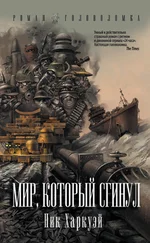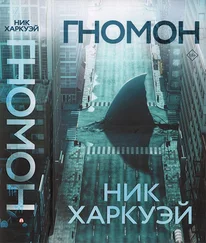The Quads were gone, not merely vanished or fled but publicly retired, even unmade. As one they rolled their bikes into the harbour and knelt – to the Sergeant’s vast embarrassment – to receive his absolution. He wanted to tell them all to apologise to the old lady for killing her dog. And to anyone else whose beloved pet they had crucified. But then he would have to take them to task for sins more dire and ultimately there would be blood, again. It was not his choice to make, and he had no desire, anyway, to see them dangle and kick from the dockyard cranes. This, though, surely this was too much?
He cast around for an escape but found none, so he duly placed a gloved hand on each of twenty heads and pressed down without words, and saw that half of them were weeping and prostrating themselves and had to be lifted up by the crowd. They would make redress where they could and carry the guilt otherwise, and that was all that the world offered anyone, for crimes and omissions large or small.
Everywhere, the press pack followed. They spoke to men and women on the fringes of the crowd, but when they occasionally ventured closer the crowd drew together to keep them away. Tigerman was a mystery, and they did not want him unmasked, did not want him to promise things or demand things, did not like it when he spoke at all. His existence was his meaning, and if he tried to encapsulate himself he might get it wrong. Which was entirely acceptable to the man inside the mask, whose stubble was beginning to itch against the slick surface, and who wanted above all else to get away, to lie down and sleep. He had work. He had work and he must find Sandrine for the boy, he must pretend again to look for himself, to track himself across the island. He must speculate with Arno. He must find out about his powers and responsibilities towards adopted quasi-orphans and how he could account for and care for the boy’s mother.
The boy. The boy had a name. He had read it, but it had felt unfitting and he had forgotten it. Boy. Boy. Son? He whispered the word and heard it echo, saw the nearest members of the crowd flinch slightly.
His focus was fading, his eyelids appallingly heavy. Soon he would black out or sleep, and there would be very little difference. He had to get away. But they were relentless: he must see everything, bless everything, and how long before they took him to the NatProMan building and expected it to fall before him like the walls of Jericho? And would Kershaw and Arno be circumspect with the Tigerman at their gates, or would they reckon to snatch him first and apologise later, to unravel the mystery? He was walking through water, through thick, clear oil, and it was cold.
And then he was rescued.
As they walked along the harbour front and he nodded to the teams of men and women clearing away the rubble of Beneseffe’s line in the sand, five men emerged from a side road wearing gas masks and firefighting gear and stood in a silent line, not so much like soldiers or workmen as monks at their offices. There was a solemnity about them, a sense of ritual and place.
The gear they wore was not his gear – not from his armoury – but a hodgepodge of local stuff. All the same it had been cobbled together somehow to make it just a little Tigerman-ish, to suggest his suit without actually being like it. They wore long coats and let their arms hang by their sides. They did not move or speak, they just waited in the faint light of the predawn. The crowd slowed and stopped, and somehow knew that they must let him go, that it was time.
Knowing it was intended, and too tired to doubt that it was wise, he walked slowly through the crowd and felt reverent hands reach out to touch him as he passed, to take a blessing from his back and shoulders, touch the stele on his chest.
The masked men did not acknowledge him as he walked between them. They did not turn their heads. Instead, as soon as he was through them they folded in behind him like an honour guard, and then streamed around him, ahead of him into an empty house and out again, heading in different directions all at once so that his own path became curiously invisible. As the last one peeled away he gave the Sergeant a gentle push: go straight ahead .
He managed one last effort, made his feet work, wished he could take off his heavy coat, the utility belt with all its useless toys.
Outside, in a backstreet, a car was waiting for him, battered and a little scorched. Flotsam, like him. He climbed in.
‘Just friends,’ the boy said hastily, gesturing back along the side road as he drove off. ‘They do not know you. Know only that Tigerman must disappear now, that we help him. They do not ask how I know. It is holy now.’
The Sergeant nodded, too tired to worry.
‘That was leet,’ the boy said after a pause. ‘It was the most leet. Onehunnerten pro cent thirteen thirty-seven. You are full of win.’
‘I didn’t get her,’ the Sergeant murmured.
‘I saw. Everyone saw. Everyone in the world. You tried so hard and it was not possible. You are Elvis. More famous than Jesus Christ. Also higher approval ratings. You saved everyone. No riots. No fire. All good.’
‘But I didn’t catch up. Too slow. I’m sorry.’ He looked over. He had taken off the mask but he wanted to take it off again, to meet the boy’s eyes more frankly and make him understand the failure. Please don’t forgive me. Please. I can’t stand it. ‘I didn’t get her. I’m sorry.’
The boy looked back at him with a strange, merciless certainty. ‘You will,’ he said simply. ‘You are full of win.’
YESTERDAY, MANCREU HAD been a footnote. Today it was the world stage. If the press pack had been unprecedented before, now it threatened to sink the island with its weight. More journalists were arriving every hour. They had their own helicopters, their own boats. One of the big networks bought and reopened the Post House Hotel, bringing in generators and satellite dishes and even carpet, and Beauville looked suddenly as if it was enjoying a new heyday, its bars full and money flowing in.
There had been, indeed, cameras everywhere, small and mostly crappy but good enough for TV – good enough to give live news some real verisimilitude. And when you cut it together the way they had it was like a movie: Tigerman bursting from a burning building, smashing through a wall. He raised an army and faced down a gang. He chased a car on foot and near as dammit caught his prey. And then he vanished with the aid of his mysterious minions into the night, leaving his deeds unexplained and self-explanatory. Meat enough for a dozen stories and substories, for analyses and commentaries, and all of it allowed them to play that footage again, to show what one man – one hero – could do on a dark night in a town on the edge. And – despite all editorial efforts – the question was beginning to form in the unspoken and the tacit: how much did all this have to do with that cluster of dark ships glimpsed in the corner of the frame?
The boy reported – after the Sergeant had slept for a few hours, which was not nearly enough – that YouTube had actually gone down for ten minutes under the weight of traffic. The story was truly global, truly immense: not Obama, not Justin Bieber, not Psy and not Bin Laden had ever touched this, he said. Not Khaled Saeed and not Mohamed Bouazizi, either. If Pippa Middleton and Megan Fox had announced their intention to marry during a live theatrical production of 50 Shades of Grey starring Benedict Cumberbatch, and then taken off their clothes to reveal their bodies tattooed with the text of the eighth Harry Potter novel, they might just have approached this level of frenzy. But probably not, the boy said, because not everyone liked Benedict Cumberbatch. If you asked the boy, personally, he would say that Robert Downey Jr’s Sherlock Holmes possessed fractionally more win, although no one could replace Basil Rathbone because he was entirely the godhead.
Читать дальше








![Ник Харкуэй - Гномон [litres]](/books/400023/nik-harkuej-gnomon-litres-thumb.webp)



